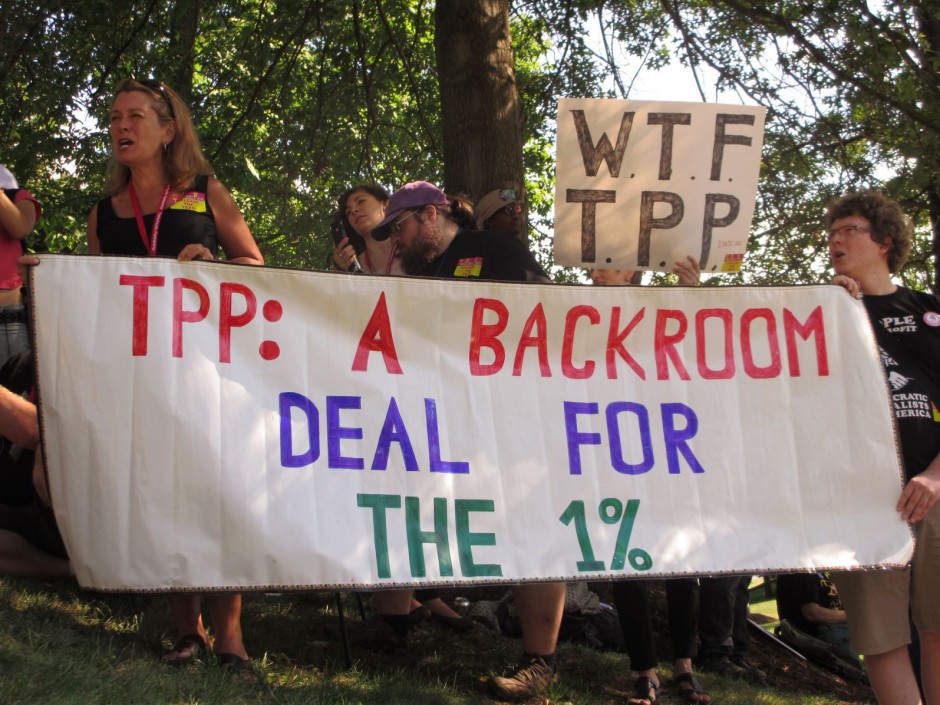Jumping the shark: Canada to sign the TPP without public consultation?
Canada’s Trade Minister has finally confirmed that Canada will sign the TPP. But there is still hope, and here’s our Meghan Sali to explain why.
This morning Canada’s Trade Minister finally put us out of our misery and answered the question we’ve all been asking for weeks: yes, she will be attending the Trans-Pacific Partnership’s signing ceremony in New Zealand on February 4th. And yes, she will take this opportunity to sign Canada on to the TPP.
Take a moment right now to tell her you’d like her not to.
Calling this opportunity a ‘ceremony’ fits with the approach Trade Ministers and TPP decision-makers have been taking with regards to this agreement, not just in the past few weeks leading up to the signing, but from the very beginning of the process.
Next Thursday’s ceremony will no doubt feature smiling Trade Ministers, the flashing of a hundred cameras, and a meticulously-planned press conference where we’re all assured that this will open our doors to essential trade and create vast economic benefits for everyone involved.
Unfortunately, what will be missing from this photo-op is the counterbalancing opposition that has been growing for years. This opposition has been deliberately circumvented by negotiating rounds and excluded from any real consultation. Those opposing the TPP will no doubt take the opportunity to raise their voices in protest – in fact the New Zealand Herald reported last week that the Auckland police have been undergoing riot training in preparation for what they expect to be a large protest.
Signing vs. ratifying
In Canada we’ve heard Trade Minister Chrystia Freeland fastidiously sticking to the following talking points as we get closer to signing the agreement:
we will have a “full open debate” in Parliament;
she is pushing for cross-country consultation with Canadians;
signing is just a technical step, the real decision comes with ratifying.
She hit all these high notes in this morning’s open letter to Canadians. We’ve been pleased to see the new government taking such a strong position on consulting with Canadians before locking us into an agreement that was negotiated entirely in secret, but there are still outstanding questions about what this consultation will look like and how much of an impact it will have on the government’s final decision.
For example, in this morning’s letter, Freeland also gave a nod to “attending public town halls, participating in over 70 meetings and roundtables” as a part of the promised consultation. But if Vancouver’s event is any indication of what counts as listening to Canadians, the format certainly leaves a lot to be desired. (Check out my observations from Minister Freeland’s Vancouver event here.)
Couple this with Freeland’s own statements about how unlikely it is that we’ll be able to renegotiate any aspects of the agreement. In her own words, “the negotiations are finished and for Canadians it’s important to understand that it’s a decision of yes or no.”
If this is truly the case, as it certainly seems to be, the impetus for signing the TPP becomes much less clear. If we are to believe the Canadian government’s statements, we’re signing the agreement because, as Freeland says, it’s “too soon to close the door.” But we’ve already been told that this is a take-it-or-leave it deal, so what would be the benefit of signing the agreement if we have no opportunity to make changes?
As supporter David says on Facebook:
Everything about this deal flies in the face of the citizens of all member countries. Signing this deal could not only threaten our economy, but also set a dangerous precedent that treaties can be negotiated in secret and signed without the consent of a nation's citizens.
Several nations have already announced their intentions to sign the agreement on February 4th, which signals that we’re moving into the final stage before this agreement can be pushed into law. Each country has two years to ratify the agreement after signing, and decision-makers worldwide are trying to make citizens everywhere feel as though this is an inevitability. It’s not.
This is why it’s critical that as many people as possible sign on to our Don’t Sign the TPP action right now, and send messages to TPP Trade Ministers. (We had so many people sign our petition this morning that it temporarily took down our servers, so you can rest assured that your message is being delivered.)


 Take action now!
Take action now!
 Sign up to be in the loop
Sign up to be in the loop
 Donate to support our work
Donate to support our work